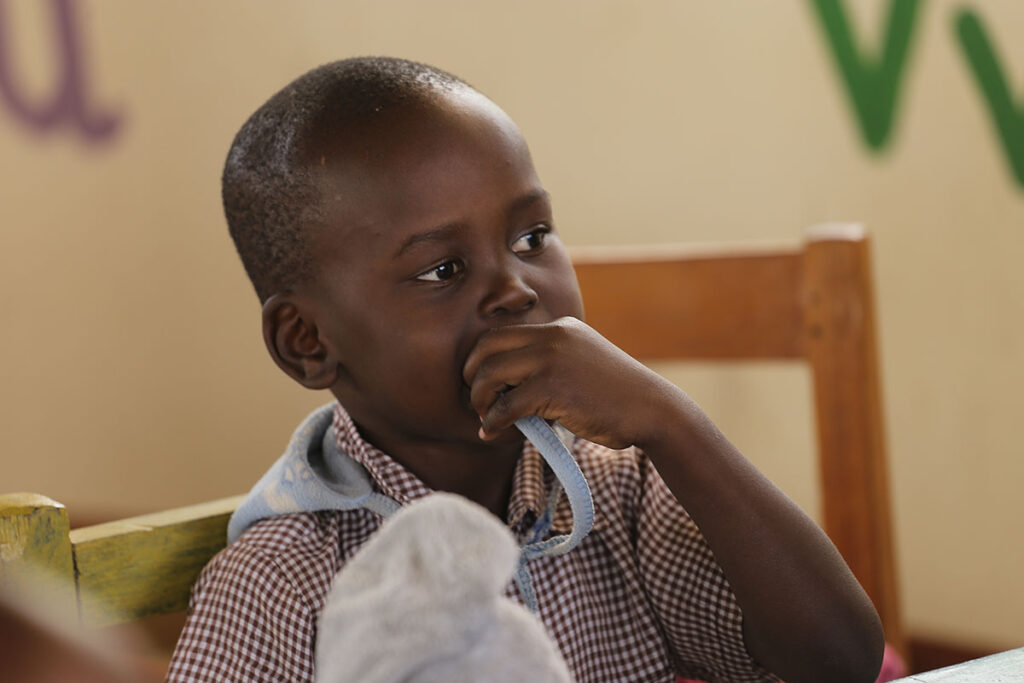Education
Program
TAHEA Mwanza believes that education is a right that every child should receive, no matter where and how they are born. Our focus is set on educational for children from 0-8 years, so that they have access to quality education that responds to the unique needs of the communities where we operate in.
Early Childhood Development (ECD) is one of our major focuses under Education program and we have been implementing ECD programs for the past 20 years. Basically it is grouped into 3 levels:
- Home based ECD program (0-3 years)
- Centre based ECD program (3-4 years)
- School based ECD program (5-8 years), which can also be split into 2 categories (Pre Primary School - 5 years and Lower Primary School classes I, II and III - 6-8 years)
Home based ECD program
The key focus is to empower families (parents and caregivers) with children birth to 3 years by strengthening their capacities to provide quality responsive care to their children through play and communication, implemented by the Children and Families, and TAHEA/Cotswold Projects.
We select and train Community Counselors who conduct home visiting and provide age-appropriate one to one counseling to parents and caregivers using the Care for Child Development (CCD) package for helping children develop cognitive, language and social -emotional skills.
TAHEA adapted the CCD package in 2016 from engagement with Madrasa Early Childhood Program – Kenya and Zanzibar. In 2020 the program was revised to include group counseling with the purpose of targeting male parents/caregivers who were always missed through the home visiting approach. The program also engages pregnant women by integrating other ECD services which are health, nutrition, security and safety in order to achieve optimal development of the child.

Centre based ECD program
TAHEA Mwanza collaborates with communities and Local Government to establish and manage community based ECD centers. Today TAHEA has supported the establishment of 30 community-based ECD centers, 12 in Ilemela Municipal, 9 centers in Misungwi and 9 in Ukerewe districts respectively serving a total of 2551 children of age 3-4 years. We have a combination of approaches on location of the centers in the community. First, we have centers which are located in the hub of the village (Ilemela Municipal) at the same time having centers which are located in the Government primary school compounds (Misungwi and Ukerewe districts).
The establishment of community based ECD centers begins with community mobilization and awareness creation through community meetings on the importance of ECD in general. We use Participatory Rural Appraisal (PRA) tools where communities make decisions on identifying their challenges and priorities before beginning of the intervention. They then develop Community Action Plan (CAP) which guides the implementation throughout. The CAP is reviewed from time to time to suit the needs. In construction of community based ECD centers TAHEA supports 80% in monetary form which involves procurement of building materials which cannot be sourced locally while community contributes 20% of total costs at each stage from foundation to finishing.
The community contribution takes the shape of both monetary form and in-kind where members can provide labor power, sand and water to the construction site while others offer pieces of their lands for ECD centre construction. In Ilemela where our initial intervention under community based ECD center programs started through the Integrated Early Childhood Development Project and Expanding ECD services through CBOs we have promoted the round shape (msonge) structure basically for the purpose of promoting culture and facilitate easy interaction of children during learning. The round structure is also easy to display learning corners which can be easily accessed by children throughout the learning process.
Any of our model design has five (5) learning corners facilitated through play based learning to support stimulation for cognitive, language, social-emotional and physical development of children. The corners are Curiosity/Manipulation area, Art and music area, Language and communication area, Water and sand area and Home area.
Age appropriate and locally sourced play and learning materials are adequately provided in each corner with support from parents and community members who replicate them regularly.
School based ECD program
- Pre Primary School – 5 years and
- Lower Primary School classes I, II and III – 6-8 years)
- Pre-primary schools
Focus on improving quality of learning and preparing children of age 5 years for transitioning into primary education. For over 5 years TAHEA has been implementing an Integrated School Readiness Program (ISRP) commonly termed in swahili as Watoto Wetu Tunu Yetu project. The project aims to ensuring children of five years demonstrating school readiness through meeting benchmarks in literacy, numeracy, and social-emotional development.
The project is has been successfully implemented in all government primary schools in two districts of Misungwi and Ukerewe in Mwanza region through the support of Children in Crossfire (CiC) in collaboration with the ministry of education, health and social welfare and the two district councils of Misungwi and Ukerewe. Initially we had implemented Fursa Kwa Watoto (opportunities for children) project reaching 40 schools in Nyamagana and 60 schools in Misungwi district respectivelly
The key elements of this program in each school include
- Overall child-friendly environment in the classroom
- Play-based learning environment
- Cost effective play/learning materials for children
- Cost effective teaching materials/aids
- Child-led activities in schools
- Teacher-led activities after being trained
- Learning corners & ‘talking walls
- Good Infrastructure (classrooms, toilets) being constructed or renovated
- Children accessing feeding programme at school
- Parents-teacher committees/Parent Partnership Programme
- Water, sanitation and hygiene (hand washing points and toilets).
This program aims at preparing children to be ready for school.
